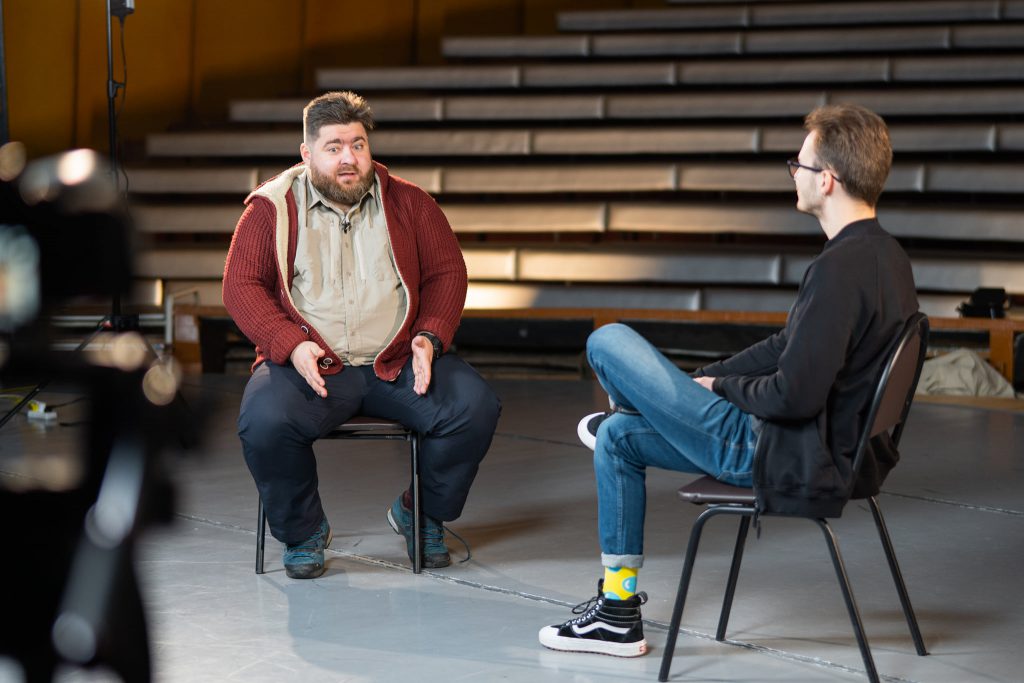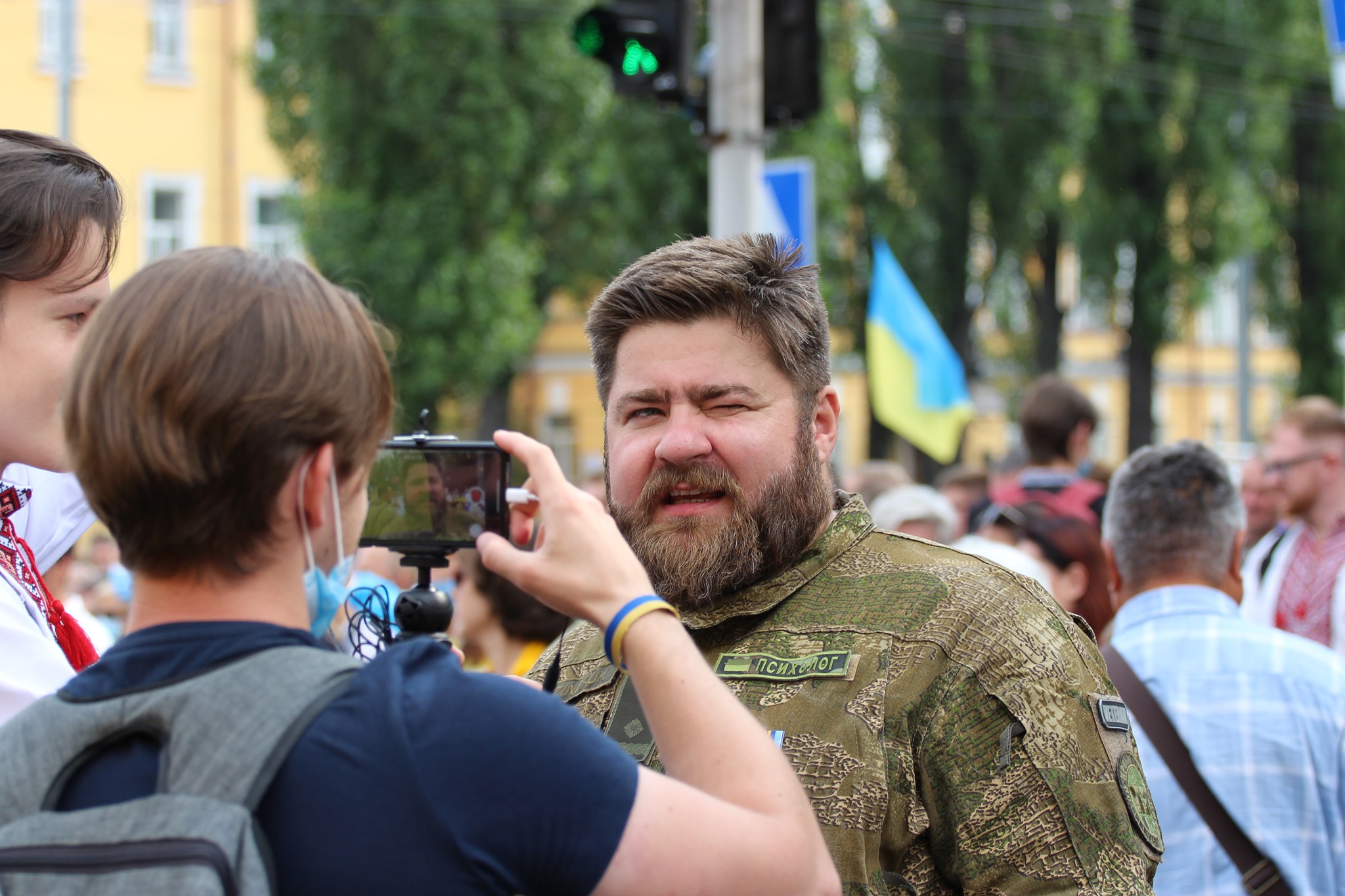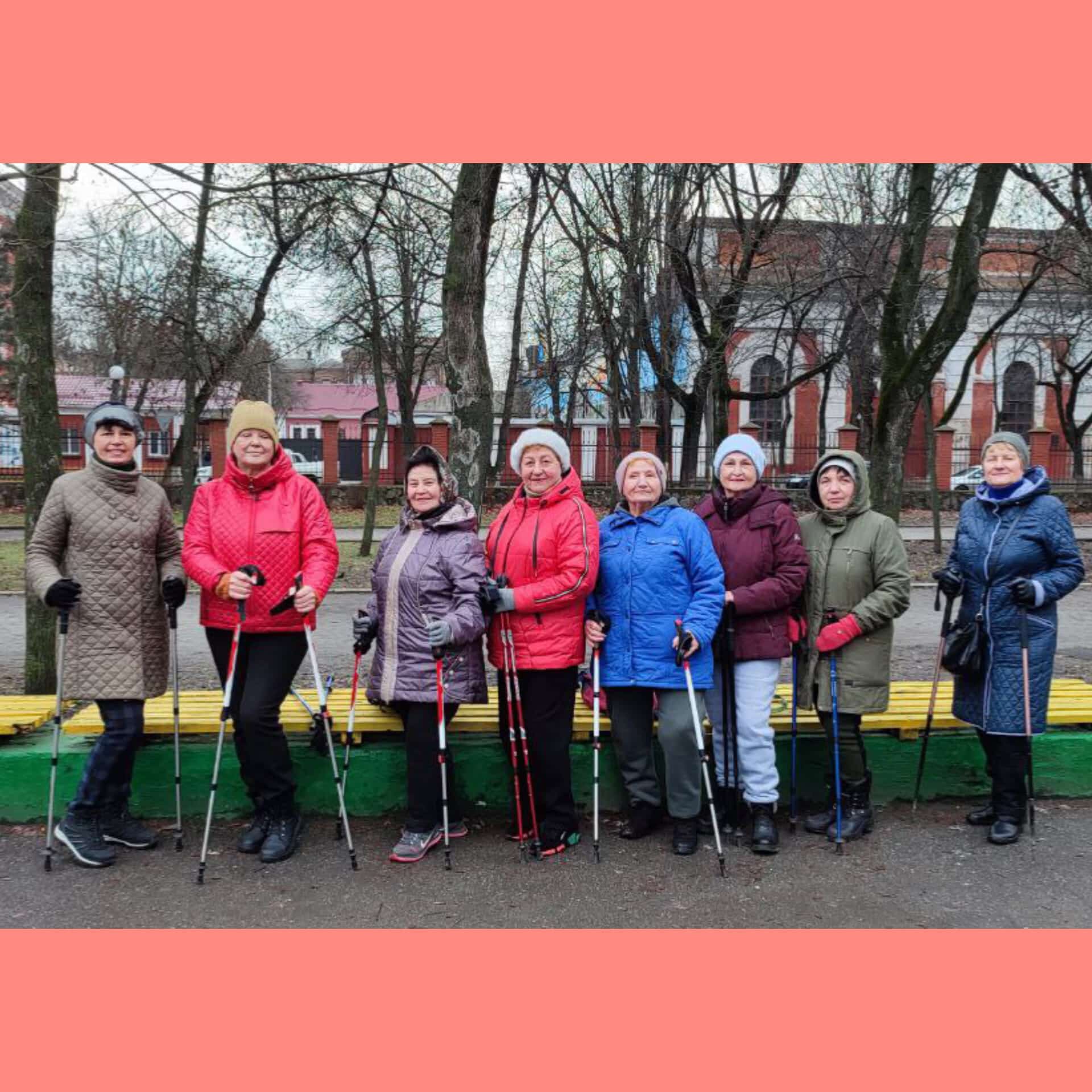Military psychologist Andrii Kozinchuk was at the frontline and goes there every year because no one knows how important the mission of people in his profession is. However, there are many nuances in the psychological support of the military, and there are very few specialists in this field in Ukraine. Read below why this happened and what you should know about working with those who went through the war.
How long have you been working as a military psychologist and how did you choose this career?
I work in this field almost all my life, since 2007 to this day. In the 8th grade, I went to Kyiv Military Lyceum, and four years later I realized that I had no option – I want to be a military. Given that my physical abilities are not for the elite force, I am a bit lazy and terribly creative, and financial resources in the family were limited, I had to choose between psychology and political science. But can you imagine what a military political scientist does? Even they cannot. So I started to study for a psychologist.
At first, I did not understand what I was doing there, and then I defended my thesis with honors. Then I was sent to serve in intelligence – I was very proud and hoped to become someone like an assistant attaché, but all five years I was not allowed to grow professionally. I was always feeling that I worthy of something more, so I went into the pharmaceutical business. However, I quickly realized that I could not do without the mission. And then there was Maidan, after which I went to war. They didn’t want to take me, I came to the military enlistment office and shouted, tried to get to war. I succeeded – I was in the combat area for 15 months. After that, I did not stop providing psychological support to the military and their families, but I reduced the number of clients because I started to burn out a lot.
What is a military psychologist in general, how does it differ from the usual psychologist?
This is the same psychologist who lives in a military environment and has appropriate education background. S/he knows the discipline, tactics, shooting, hierarchy, and so on. However, the biggest difference is not in this. For the ordinary – let’s call them a ‘civilian’ psychologist – the clients and their psyche is the greatest value. Say, if a client decides to quit a job or a girlfriend, the counsellor will be completely on his side, because he will be better off. The highest value of a military psychologist is the performance of military duties.
However, this does not mean that such a counsellor oppresses or destroys people for the sake of victory. I never influenced the soldiers so that they would then go to the minefield. But I pulled them out of the comfort zone and made them more active. In addition, I had a task to check compatibility. Let’s imagine one post where two people will be on duty for more than a day. If they can’t stand each other and also have weapons, it’s bad and ineffective. Or vice versa, if they are two best friends, they will have more fun than work.
When it comes to postwar period, there is a noticeable difference in terms of involvement. A civil psychologist monitors their boundaries and the working hours. And I used to get a call on the first night asking “we just prevented a guy of hanging himself, we don’t know what to do next,” and I went immediately to help him. You have no office and assistant to form your schedule. At the same time, it is easier for me personally to work with the military, because I know this environment from inside. When I started working with other people, a woman came to me and began to tell me that she had a high level of anxiety, because she thought that her husband did not like her and began to give flowers less often. And before that, I had a widow who could not get the opportunity to see the body of her deceased husband, and she suffered greatly. I could barely contain my emotions, exhaled and thought, “but the husband who stopped giving flowers is still alive.” Later, I passed this stage, so now I work perfectly with any problems.
What is more difficult and what is simpler – to be a military or civilian psychologist?
No job is more complicated or easier. For example, there are psychologists that generally should not approach living people. But they are excellent researchers, and we need them. If I were asked what was harder – to be a military psychologist or to do research – I would say: “I’m back to war, just do not make me sit long hours reading these papers.” And someone else will say the opposite: “Research is easy and clear, there are tables and formulas.” Therefore, it is important to realize what do you prefer. There are many people who are constantly looking for job. However, you should not look for a job, you should look for yourself. Because the job will appear and go, but the identity is forever.
You don’t have to look for a job, you have to look for yourself. Because the job will appear and go, and the identity is forever.
That is, military psychologists who did not go through the war are also considered as such?
Sure, they have theoretical knowledge and can influence certain processes. I am generally against all military psychologists serving, because it does not pass without consequences. I was also experiencing stress, and it took me a year to came out of this condition. However, I received my superpower. When you counsel, you start with identification. You need to show who you are and what are your goals as a psychotherapist. Most of this identification takes from 20 minutes to a few sessions, and I manage to do it in literally five minutes. Identification gives a lot, but many psychologists do not use it – as a result, they lose contact with a client and may not get to the main story. And the main story of the majority is not a war (it only reveals it). We are all traumatized and do not need to go to the frontline to suffer it.
Is it possible to divide the work of a military psychologist into some stages?
Yes, three stages. The first is training, psychoeducation. These are training institutions and barracks, where you work with people who boldly shout “Glory to Ukraine, let’s go to battle” and explain them how the psyche reacts to traumatic conditions. You don’t have to be burned in a tank or be the only survivor of a platoon to get traumatized – as simple things as the lack of information about what’s going on around you, how much ammunition or food you have, when they’ll pick you up is enough. In essence, there is a theoretical part to discuss it, and a practical part that teaches you to act on your own.
The second stage is support. That’s when you go to the frontline with the soldiers. You observe, you fight, you check compatibility and you predict losses. It is important to see a person who bears a lot of responsibility, but is already broken inside. They can take down a dozen more subordinates with them. The task of a military psychologist is to get such military servants out of this condition.
It is important to see a person who bears a lot of responsibility, but is already broken inside.
The third stage is returning and adapting to new conditions. First, I’ll tell you how this should ideally happen. After their term of service, soldiers are tested and diagnosed to determine their condition. All this information goes to the Ministry of Veteran Affairs, where responsible people make a forecast and choose – refer a soldier to a hospital, sanatorium or “all is well, get back to service.”
Now about how it really happens. We have a small number of veteran communities searching for psychologists and supporting the military upon their return. The demand is huge, but there are only a few people who can satisfy it. In addition, how the system work is that usually, a veteran goes to someone for help instead of the providers initiating this help to a veteran.

Do all veterans need psychological support?
Do all other people need it? If you can’t handle it yourself, you don’t have to do it yourself; but you don’t have to go to a psychologist if you don’t like it. You should contact a person who will hear your problem and will not get a bottle of vodka to relax you, but at least will say: “thank you for sharing, it’s important to me” or “let me hug you.”
How long can veterans adapt after the war?
Statistically, it may take from six months to two years. But in fact, it lasts a lifetime. That’s also the matter of triggers. For example, when the war in eastern Ukraine began in 2014, it triggered the veterans of the war in Afghanistan. They mostly already had a quiet life, and at one point they began to suffer again.
There is no guarantee that in two years, everyone is adapted. However, finding a good specialist in advance is a good strategy, even if you don’t go to him or her right away. For example, if you insure yourself completely in some cool insurance company, you do not intentionally break your legs. But when you have insurance, you level of anxiety reduces, and the sense of security increases.
By adapting after the war, a person can be more efficient and successful than s/he was even in better times.
There are three states of the brain: survival, functioning and development. In the first case, there is no shame, you are essentially an animal and do what you want. And while you are in survival mode, you cannot develop, because the part of the brain that is responsible for this is blocked. Imagine a soldier sitting in a trench and learning English – s/he reads textbooks, s/he tries hard, but it does not work out. Because you cannot deceive your brain. Then there is functioning – when you already feel safe, but still not in full control of the situation. And only when you can conditionally control your life, you move to the level of development. And we use to immediately provide some training to the veterans who have just returned from the frontline. This is an ineffective sharp jump. The period of adaptation can be different, long and specific – many people sleep in linstocks after the war or do talk to their family members at all.
For example, like most veterans, I felt guilty that “the best of us died in the war.” It must be compensated. At first I tried to do it with alcohol – it didn’t work, so I went to work long hours, but my performance dropped. As a result, I was recommended a supervisor, a military psychologist who also served in the army. And he said that when I have a rest, it’s also a part of my work. Because without it I will work badly. I can’t work with a client when I am burned out.
Does the government help at all? Are there programs for veterans?
If you made a journalist request, you would be sent tons of information with the results and programs. Meanwhile, the psychological rehabilitation of a veteran in our country is when s/he goes to a crooked sanatorium and eats noodles there three times a day. There’s nanotechnology for PTSD: massages, pine baths, mineral water and a paid psychologist. And this is complete rubbish.
In 2016, I met a veteran who claimed that boys need to gather at a hotel, have a good drink, have a holiday affair, and that’s what helps them. Then I denied this theory. And in 2017, the difficult fate of a military psychologist sent me to accompany our veterans to Switzerland. We were received there by an Afghanistan war veteran, who now owns a hotel and gladly agreed to accommodate 10 veterans free of charge. This trip had such a positive effect on all of us – there was no ban on alcohol, no control, no coercion. Then I realized that the main thing is respect. Not that we are veterans, but that we are human beings. And the sanatorium is about the staff wearing white dressing gowns and a place where you come and get your outpatient card. This is your status there.
There are various initiatives where veterans are trained to become entrepreneurs or managers, but it’s not implemented at the systemic level. The whole Ministry was set up, but no budget was allocated for the implementation of projects, now the money basically covers the salaries of people working there. As for military psychologists, the situation is sad, too. They often do not develop, but at least have empathy and can listen. There is a need for this too, because the wife, children, friends are not always ready to do it. So, a veteran comes and shares his thoughts and feelings, but it’s unclear what to do next with this information and how to turn it into their own superpower. People need to be taught to communicate – to love, to argue, to come into peace, to admit guilt, and so on. Because they often remember first of all why they were taught in the war – “dress, attention, permission to speak, sir!”
In general, if we take mathematical calculations, it’s good for the government to not have veterans with PTSD or depression. Because the government needs them to work and pay taxes, otherwise money goes to support them. Therefore, all possible programs and projects are an investment in the future.
How did the war affect your work?
I realized that I knew nothing. Military psychologists are trained by only one university in the country – Taras Shevchenko University, which has a military institute. At the time, 20 to 40 people a year graduated from this program in the whole country. However, good military psychologists understand that the army is a sharp downshifting, and evade it in various ways. They go into business, IT, real estate and use their skills there. There are really few people who are ready to work in their specialty. When the war burst out, the journalists, historians, and humanities teachers began to take on this role. Because “it doesn’t really matter, he will tell some fairy tale and a soldier will go to fight.”
During the war, I began to rip and tear, but quickly realized that only 30% of my knowledge and skills are effective, and the remaining 70% are useless. Therefore, after returning, I was looking for ways to acquire knowledge that was not available in Ukraine. In 2016, Uliana Suprun whom I am very grateful to recommended me for a program for military psychologists in the U.S. and I was enrolled there. After that, there was a lot of training from foreign specialists, I continued to develop myself and move along this path.
Now I have chosen a strategy for myself – to work with veterans who have achieved something, such as MPs, opinion leaders or business owners. So that they can influence the others. A successful veteran – when worked well with – can take on 10 more veterans as a mentor. It evolves into a kind of a pyramid, the experience multiplies. Sure, you can take a mischievous veteran, spend a lot of energy with them, but globally do not change anything. However, it’s like scraping the asphalt. Such processes need to be optimized.
What are your main principles in working with veterans?
The first is honesty. If I lie to them, my reputation and trust in me will never return. Secondly, directness and lack of pity. I will not oppress them, but I will not pity them either. Third, as with civilians, if I see that their story is my story, then I am ineffective. I will solve my problems through them. Also, my trick is that I allow clients in our messenger correspondence to whine, brag, share, send something – for example, some may write to me at 2 in the morning or send me a poem.
Obviously, you like what you do, because you talk about it very passionately. Why?
This is an applied science. The psychology is like about everything at once. And military psychology is about a closed team. It is overwhelmingly made up of men who are terribly and charismatically aggressive or evil, but are actually gentle and romantic. My clients and I learn to do a lot of things we can’t or have forgotten to do. For example, to love or allow yourself to love, empathize and sympathize. It is always a long game and it happens that you as a specialist do not see real changes, because they come after you stop working with that particular client.
At the same time, the role of a military psychologist, even at the frontline, is underestimated. Often they become morale officers, paint wall newspapers, drive cars, because the command does not yet know how to use their skills. And people are afraid of what they do not understand.
Probably, even the military psychologists themselves do not realize before their journey to the frontline how serious is a profession they have chosen. Most think they will read minds and gather crowds of girls around them. Spoiler – no. Then, there is the feeling of “I can do anything,” but it quickly comes the disappointment. You work with the fears of others, but you have your own. And you often can’t be an effective warrior. In addition to having a machine gun, grenades, a pistol, etc., you also perform official duties. Your roles as a psychologist and a soldier can cross paths and ruin something. It is important to understand that there is risk about it.
Do you identify yourself more as a psychologist or as a warrior?
A good question that I asked myself many times. Theoretically, I am a psychologist, because I perform algorithmic tasks, do not share my clients’ stories with anyone, practice. But my feelings are still closer to the soldier’s. So, I’m a hybrid. Once a year I consistently need to go to the combat area, so I ask to join some brigade for a week. Thanks to such travels you begin to appreciate life more – to break away from the usual and safe course of events, to breathe this air, to look into the distance and realize that somewhere there the gray zone is already ending. When I am infuriated by something in Kyiv, I go to the combat area, come back and understand that I love everything, I like everything and it suits me. That’s where I feel this transformation. When you cross the border and arrive at a post or platoon station, you are made a disgusting instant coffee and pour a huge portion of condensed milk into it. The taste is incredible, but it’s so delicious there.
How emotionally difficult is it for you to endure all this?
Nobody tells me to keep my emotions to myself, so, I do not hide them even during consultations, and I ask many clients to let me curse. Clients tell me something, and I react vividly, like a person, not a machine. At the same time, I follow all the principles – confidentiality, practicality, homework, just all this has a different form. I don’t need a person to talk academic language to me, frustrate, or explain how their inhibitors work. I need to hear from people about their real feelings, often experience them together, and only then get rid of this information. If I can’t cope on my own, I have my supervisor and my rest. I try to capture the emotions of life and have my own stories, because I can’t share stories of my clients, although I have so many of them that it will be enough for a whole Netflix series.








